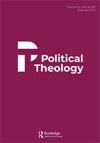Politics as a Confession: Confronting the Enemy Within
IF 0.3
0 RELIGION
引用次数: 0
Abstract
ABSTRACT In this article, we claim, firstly, that the turn to an “ethical” politics focused on subjectivity and its transformation, announced by post-structuralist theorists in the 1970s, can be found today in forms of progressive politics, illustrated by struggles against racism and their articulation by consultants and educators. Secondly, this turn entails targeting the “enemy within,” whether it be the inner fascist (Guattari, Foucault) or white privilege (Di Angelo, Kendi). Rather than an extension of Lasch’s therapeutic “culture of narcissism,” it is a turn to practices reminiscent of public rituals of expiation of guilt and acts of purification (exomologesis) characterizing what Weber referred to as “sects.” Pace Foucault, the “main danger” lies not in the “subjectifying” practices of the human sciences descended from auricular confession and the Christian pastorate, but rather the displacement of formal politics and attendant “civil religion” (Bellah) by conflicts between charismatic sects claiming exemplary subjectivity and virtuosity.政治是一种忏悔:直面内心的敌人
摘要在这篇文章中,我们首先声称,后结构主义理论家在20世纪70年代宣布的向以主体性为中心的“伦理”政治的转变及其转变,今天可以在进步政治的形式中找到,反对种族主义的斗争以及咨询师和教育工作者的阐述就是例证。其次,这一转变需要针对“内部敌人”,无论是内部法西斯(Guattari、Foucault)还是白人特权(Di Angelo、Kendi)。与其说是拉施治疗性“自恋文化”的延伸,不如说是转向了让人想起公共仪式的做法,即赎罪和净化行为(exomologesis),这些行为被韦伯称为“教派”,“主要的危险”不在于源自耳道忏悔和基督教牧师的人文科学的“主体化”实践,而在于形式政治和随之而来的“公民宗教”(Bellah)被声称具有模范主观性和精湛技艺的魅力教派之间的冲突所取代。
本文章由计算机程序翻译,如有差异,请以英文原文为准。
求助全文
约1分钟内获得全文
求助全文

 求助内容:
求助内容: 应助结果提醒方式:
应助结果提醒方式:


